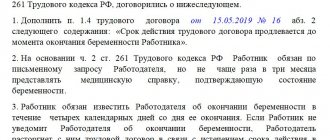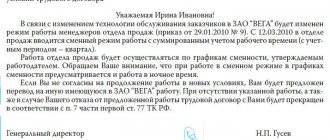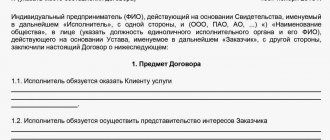As a rule, we check the “papers” on the run, glancing briefly at the beginning and ending, and hoping for the integrity of the other side. For which we then pay with our nerves and “rubles”.
Types of employment contract with an employee - how do they differ?
According to the law, the employee-employer relationship must be formalized by certain documents. Namely, an employment contract, according to which (Article 56 of the Labor Code) the employee must perform his labor functions and comply with the rules of the organization, and the employer must pay him his salary without delay and in full.
That is, an employment contract is an important document that clearly defines the rights and obligations of both parties.
Compensation for unused vacation in 2020 - with and without dismissal
Preparation of contract
Let's consider what is the procedure for concluding an employment contract at the stage of its immediate preparation and signing. Lawyers recommend paying special attention to the structure of the document. Let us note the following key nuances that concern it:
- Full name must be indicated in the contract. employee, full name of the employing company;
- you need to reflect information about the documents that identify the employee;
- it is necessary to indicate the TIN in the contract;
- information about the place of work and the coordinates of the branch should be reflected in the contract;
- it is necessary to enter data reflecting the specifics of the employee’s labor function, which corresponds to the vacancy, qualifications or specialty of the person;
- the terms for concluding the employment contract should be indicated;
- it is necessary to reflect the conditions for the payment of labor compensation, the formula for their calculation;
- other necessary information must be included in the contract.
In this case, the employment contract can subsequently be supplemented with documents reflecting changes in it. However, the fundamental point here is that at the stage of preparing the contract, the employer can still offer the hired employee the conditions for performing labor functions unilaterally. But once the employment contract is signed, any changes to it are possible only if the employee agrees to them.
What an employment contract can be in practice and according to law:
- Civil law. This version of the contract takes place when the manager is “backed up”. It is concluded for the provision of specific services in order to easily fire an employee in a “you are not suitable for us” situation. If the employee manages to prove himself, they move on to an employment contract.
- Urgent. In this case, the contract secures the employee’s work for a certain, very specific period, and not indefinitely. And after its completion, management can legally dismiss the employee. Or rehire him by issuing a dismissal order and concluding a contract again. True, the employer must have good reasons for concluding such an agreement. Otherwise, these actions will be considered illegal.
- Labor. The most common type of contract, which involves indefinite work under certain conditions specified in the document. This agreement, drawn up in writing, is a guarantee of respect for the employee’s rights.
What documents does an employer not have the right to request?
If we turn to Russian legislation, then a complete list of documents that an employer cannot require from an applicant is not prescribed either within the Labor Code or the Civil Code. Therefore, this question can be answered, but only based on the content of Art. 65 Labor Code of the Russian Federation. In particular, an employer cannot require a future employee to:
- certificates confirming that the applicant’s relatives have infectious diseases and mental disorders;
- a certificate from the woman confirming the absence of pregnancy;
- documents on the ownership of movable or immovable property, etc.
If an employer requires such documents from an applicant, then, according to current legislation, such actions are considered illegal. In particular, for the reason that this may violate the Law on Personal Data. In addition, some documents, in particular, a certificate confirming that a woman is pregnant, can become a cause of discrimination when hiring. In such cases, a citizen has the legal right to contact labor protection and safety authorities, namely the Labor Inspectorate.
Labor or civil law - differences in contracts:
- TD is work in a specific position according to existing qualifications. GPA is the implementation of certain tasks with an end result.
- According to TD - salary in the amount specified in the document, according to GPA - remuneration.
- With TD, the work is carried out personally by the employee; with GPA, only the final result is usually important.
- Failure to fulfill duties under TD may result in discipline, reprimand or dismissal. Failure to comply with civil regulations is already a matter of civil liability.
First, read it carefully and pay attention to the most important points:
- Compliance of the order and the contract. When the employer includes important clauses in the contract, they are also included in the order to hire you. And the primary one (note - in controversial situations) will always be the employment contract. Therefore, ensure that these 2 documents correspond to each other. Let the information in the order be in an abbreviated version, but it must fully reflect the conditions specified in the contract. Any inconsistencies (note: provisions in the order that are not specified in the contract) have no legal force.
- Probation. It must be specified in the contract. Maximum period – 3 months. In the absence of this clause, the employee is considered to have been hired without a probationary period and, accordingly, they have no right to dismiss him later as having not completed this period.
- Specific place of work. If it is not clearly defined by the employer in the contract, then it will be extremely difficult to fire an employee for “absenteeism” - after all, the workplace is not specified. That is, if you are fired for absenteeism, in the absence of this clause in the employer’s contract, the employer will be obliged through the court to reinstate you at work.
- Responsibilities. They must also be spelled out clearly and specifically. Otherwise, the employer simply does not have the right to demand that the employee perform certain tasks “in accordance with the contract.” The employee can safely declare that the work that he is required to perform is not included in the scope of his duties. And it is also impossible to fire an employee for failure to complete tasks not included in the contract.
- Salary limit. It must also be stated in the contract. And if this maximum limit is underestimated, the employee can safely go to court. It is worth noting that your bosses should notify you of all changes in your pay only in writing and a couple of months before the change itself. One cannot fail to mention payment in kind. It happens that instead of a salary, employees are given products produced by the company. This “method”, alas, has not yet become obsolete. It is considered legal if “in kind” does not exceed 20% of the salary, and is also suitable for consumption (use) of the employee and his family.
- Rules. Before concluding a contract, your management must familiarize you (exclusively against signature) with the company’s internal labor regulations and other acts/regulations that are directly relevant to you.
- Contents of the agreement. Read the document carefully! It should contain not only your place of work and position, but also a list of responsibilities, payment terms (including all bonuses with allowances) and the issue of social insurance, the start date of work. Additional conditions may also be specified: rest/work schedule (if it does not coincide with the regime of other employees), the issue of compensation for “harmful work,” special conditions (business trips, etc.).
- Responsibilities. Demand that they be spelled out clearly and in as much detail as possible. That is, the position itself, the specific type of work and the department itself in which the work is expected. If the contract states that you will perform your duties “according to the job description,” then ask for instructions - it must be attached to the contract with your signature (note: a copy is kept in your hands).
- Social insurance. Important point of the contract! And the information from this paragraph must be entered in accordance with federal laws. This clause is a guarantee of compensation for damage in the event of a force majeure situation, as well as temporary disability, maternity, etc.
- Recycling. The contract must specify the exact number of working hours. And when overworked, you will be paid for the extra time worked in 1.5 or double the amount. What to do if your boss forces you to work overtime and on weekends?
And finally, it is worth recalling that the agreement is signed only by the director and only in your presence, and the name of the company appearing in the papers must be the same everywhere.
When should I start working?
So, we have studied what is the procedure for concluding an employment contract. From what moment can a person start working (if we are not talking about the scenario when he started doing this before signing the document)? According to the provisions of the law, an employment contract is considered to come into force immediately from the moment it is signed by the employing company and the new employee.
Accordingly, if a person began to perform his duties before he signed the document, then the contract is considered valid from the day the employee actually began working. Also, the contract itself may specify a specific period from which a person can begin to perform his duties. If such an option is not specified in the contract, then the employee can begin working on the next working day. Moreover, if a person violates the terms, the employer has the right to cancel the contract.
Duration of an employment contract – what should you pay attention to?
When hiring, a contract is concluded for a specific or indefinite period, depending on the job.
- Classic contract (for an indefinite period). In this case, the period for which you are hired is not specified or specified at all. That is, you are hired on a permanent basis, and termination of the employment relationship is possible only in accordance with the procedure established by law.
- Fixed-term contract. An option when you are hired for a period agreed upon by 2 parties to perform a specific job. The maximum period is 5 years. In addition to the validity period, this agreement indicates the reasons for not concluding a regular contract (they are approved by law, and the employer has no right to expand the list of reasons). This contract is terminated upon expiration of its validity period by giving the employee at least 3 days written notice. In the event that the contract term has expired and the employee is still working, the contract automatically becomes “indefinite”.
Trial period
The first period is an introductory period. Within the framework of it, there is, in fact, a personal acquaintance between the employer and the hired employee; both formal and informal aspects of communications may be present.
So, for example, in order to correctly formalize the employment relationship, an employee must provide the employer with a number of documents - an identity card (usually a passport), SNILS, diploma or other source confirming qualifications. If a person gets a job not for the first time and he has a work book, he is also obliged to hand it over to the employer. The procedure for concluding an employment contract involves providing a certificate with a TIN, as well as, if necessary, a military ID. In turn, if a person gets a job for the first time, the employer must assist him in preparing the necessary documents.
We noted above that, along with the execution of the main contract document confirming the official employment - an employment contract, the employer may have an obligation to familiarize the employee with certain local regulations. Lawyers note that many of these sources must be provided to the person before concluding an employment contract. This applies to internal regulations or, for example, samples of collective agreements.
It is worth noting that fixed-term contracts are divided, in turn, into...
- A contract with an absolutely definite duration. This type of agreement is applicable when a person is elected to a certain elective position. In particular, with governors, rectors, etc.
- A contract with a relatively specific duration. The case is for persons admitted to a temporary organization created for a specific job and for a specific period. Termination of the contract occurs after the end of the organization's existence.
- Conditional fixed-term contract. An option for the case when an employee is needed only temporarily - as a replacement for an employee who is temporarily absent for specific reasons (business trip, maternity leave, etc.).
What to do if you don’t give vacation at work?
The site Colady.ru thanks you for your attention to the article! We will be very pleased if you share your feedback and tips in the comments below.










